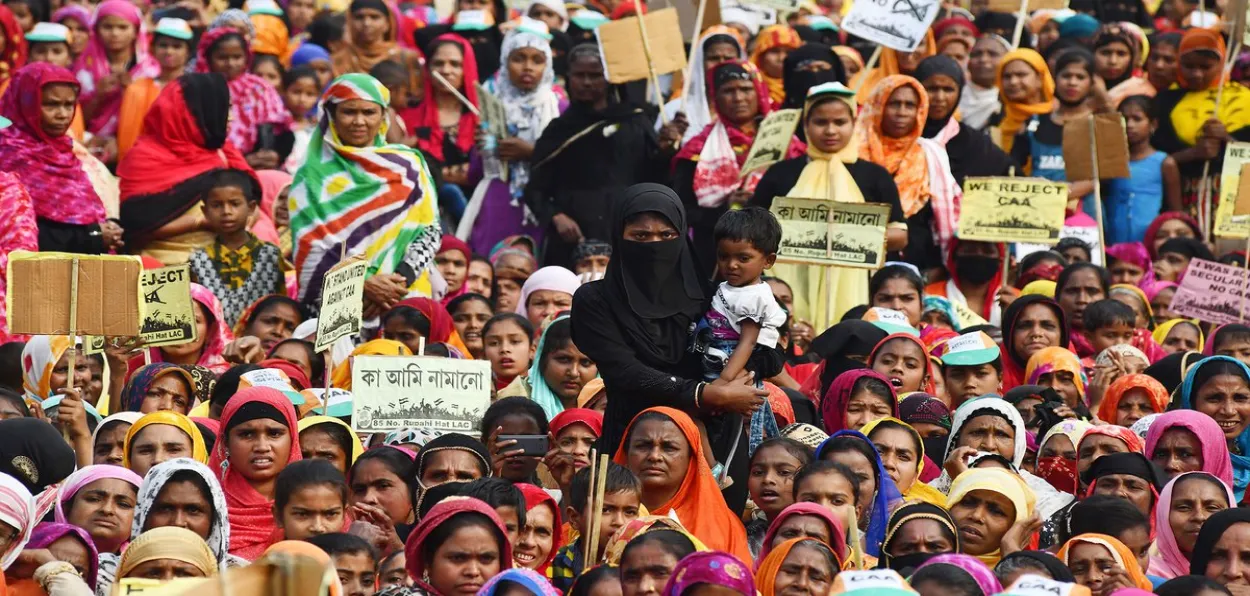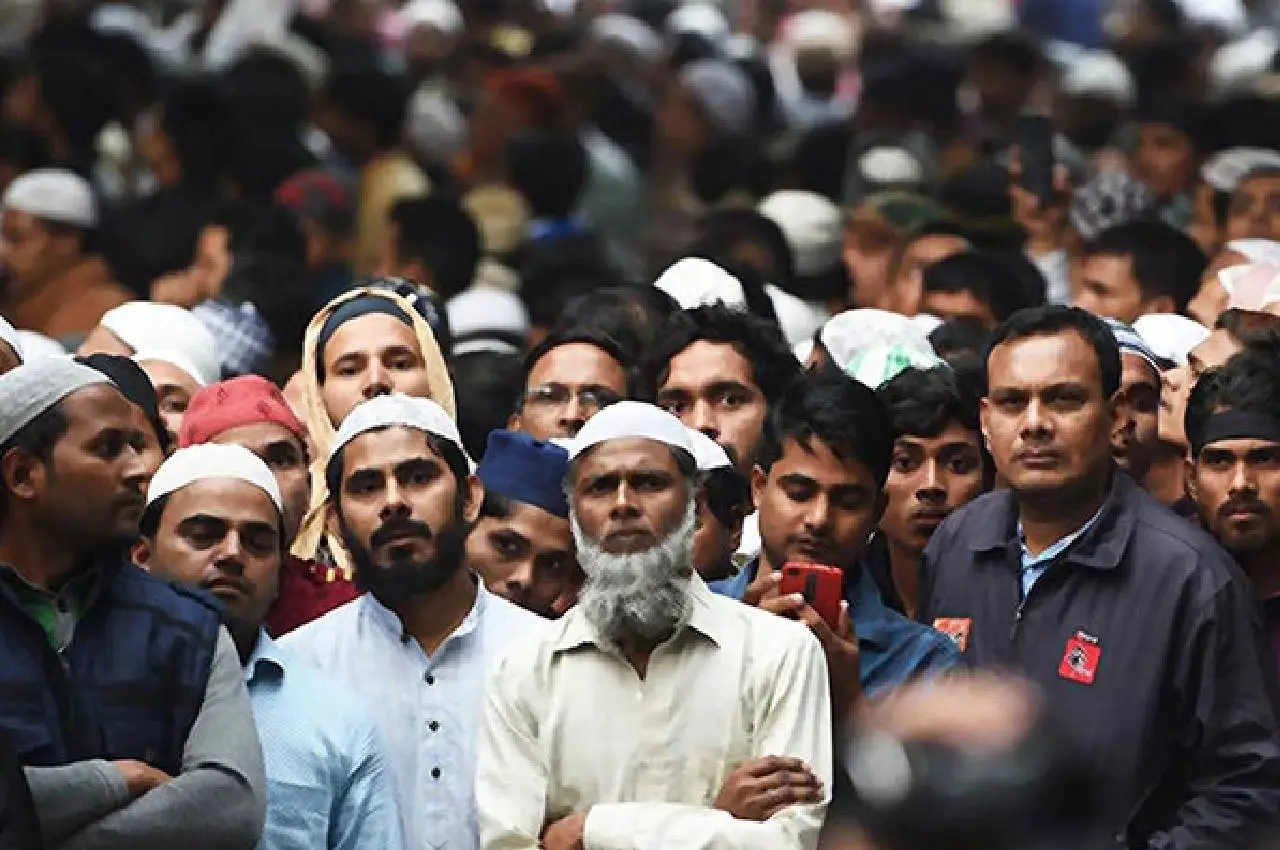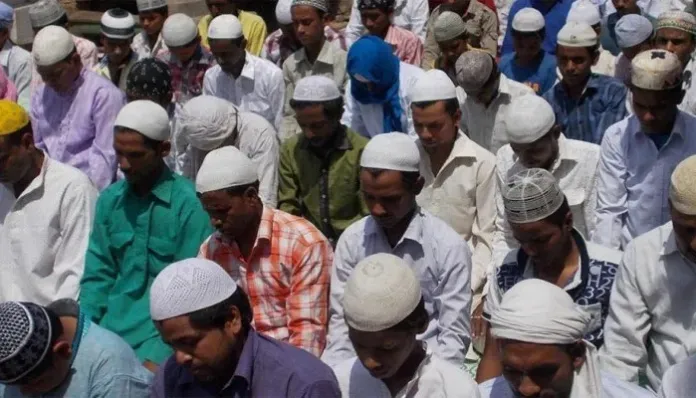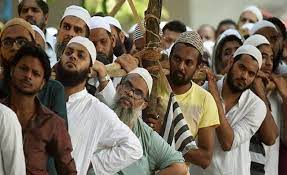
Abdullah Mansoor
Pasmanda Muslims remained anonymous in the nation's political edifice until each and every vote got equal importance in a democracy. Even today, the 10th-11th generations of Ashraf Ulema, are presenting their history as the history of Indian Muslims.
The history of majority of Indian Muslims -Pasamanda - is a history of humiliation. Today, the Pasmanda movement is not only questioning the hegemony of Ashraf but also seeking to rewrite history and change the symbols and idioms of ‘minority’ politics.
This write up is to explore the status of the Pasmanda castes like Lalbegi, Halalkhor, Mochi, Pasi, Bhant, Bhatiara, Pamaria, Nut, Bakkho, Dafli, Nalband, Dhobi, Sai, Rangrej, Chik, Mirshikar and Tailor, etc. during the so-called Muslim period.
Pasmanda society was manipulated to consider the experience of Ashrafs as theirs too; rejoice on their victory taking it as theirs too and taking their false stories as Muslim history. As a result ulema, emperors and sultans became divine men instead of historical men. Thus emperors were made the subject of Muslim faith. No research can tarnish his image. If someone did this, people would start looking at him like he has committed blasphemy.
Most of the Ashraf historians, poets, writers presented the history of the medieval period as their golden age. They did the same with the history of ancient India; showed the sultans and emperors as the representative of the Muslim society. For this reason, the hardline Hindutva forces in India have been targeting India's 'Muslim history' and 'Muslim emperors' and 'Muslim identity' for decades. This makes them target the Pasmanda whose pain and exploitation of centuries at the hands of the history-writers remains sugar-coated.
Do these Sultans and Emperors represent Indian Muslims? Wasn’t the so called “golden age of Muslims’ era the period of slavery, subjugation and contempt for and decadence for Pasmanda Muslims?
Historically, it cannot dismiss the fact that the political-religious-cultural sovereignty of these 'Muslims' and their foreign emirs was outside India. Just as during the Hindu rule, caste, race, country, state was more important than the Hidu identity.
Similarly, Muslim identity was never a single identity; it was the same during the reign of Arab, Turks, Khiljis, Lodhi, etc. The identity of the foreign race of these Muslim emperors has always remained prominent. This generated hatred of local culture and they used their languages and also gave it political protection.
The Court language was never the language of Pasmanda as the rulers considered their languages as inferior. They keep shajra, the family tree wherein they place their forefathers’ and that of the city of their (foreign) origin.
Also, it must be noted here that Lodhi and Suri rulers gave importance to Indian culture because they were considered inferior for being from Afghanistan instead of Arab-Iran. Ashraf writers, poets, historians and film directors introduced their culture as culture of Muslims.

In the process of adopting the foreign culture, Pasmanda Muslims got disconnected from their culture while Ashraf never owned and mingeled with them. In times of trouble on Ashraf the Ulema blamed the general fall in the faith due to the Pasmanda adopting the Hindu customs.
Ashraf are never tired of arguing that Muslims ruled India for 800 years and in the process they flaunt their foreign and invader identity. To argue against forced conversions, they also say that if the (Muslim) emperor wanted, everyone in India would be Muslim today.
Why did the emperors not convert all Hindus into Islam? Were they all secular or believed in the teaching of Islam - your deen (Faith) with you, my deen with me) - or there was economic reason and their disdain towards the lower castes?
The administration of 'Muslim' sultans and emperors had no Pasmanda official. Even the Muslims who had converted from the Hindu upper castes were not there at least in the beginning.
Historian Mubarak Ali writes in his book 'Tarikh Tehqiq Ke Naye Ruhjanat' that when Islam reached Iran, it got moulded into its social milieu. Pasmanda scrap dealers, weavers, fishermen, cattle traders, etc. were looked down upon in the Iranian social model and considered to be of poor race. In Iranian society, one’s family’s position was more important than a person. The Sultans and Mughals of India brought Iranian culture and the Persian language and social norms of discrimination to India. Nizam-ul-Mulk Tosi has written in Siasat Nama that the Sultans of Delhi had accepted the ideology and civilization of Iranian kings.
Turks had dominance over state departments and higher posts. Muslims of Indian origin (Pasmanda) should stay away from departments (government) and posts. Muhammad bin Tughluq was the first emperor of Delhi who gave some high positions to Indians who had converted and become Muslims. However, this was resented by the Muslim immigrants, whose used their closeness to the administration and tended to the un-Islamic idea of caste identity. Sultan Shamsuddin Altamash and Ghiyasuddin Balban looked down upon the local Muslims. Altamash dismissed 33 Muslims (Pasmanda) from government only because they didn’t come from upper class families.
Balban dismissed the 'low' Muslims (Pasmandas) from government posts and said: “My blood boils when I see a member of a lowly family”. They used to give positions to men on the basis of race and caste. If a local Muslim tried to reach a higher position, he would be removed.
Masood Alam Falahi writes in his book 'Jaat-Paat aur Muslim', during the time of Sultan Iltutmish and Balban, who were from the slave dynasty, the appointment of a person from a 'lower' caste (even if he was a Muslim) to a high position Could not have happened.
If it was known that an official belonged to a lower caste, he was dismissed. Balban had actually made a department 'Nakabat' which used to check the caste of the officials. Balban believed that the responsibility of governance cannot be divided among the elite.”
During the time of Sultan Shamsuddin Altamash, Nizamul Mulk (a high official post) Junaidi (Kori/Julaha) wanted to give a post to Jamal Marzooq, a Pasmanda, minister Khwaja Aziz bin Behrouz read a Persian verse which means -'Don't give pen in the hands of the lowly, if he has the courage, he will make the black stone in the Kaaba a lump of istinja. (feacal matter covered with soil).
It is also worth noting that the early Sultans were slaves. Irfan Habib writes that slaves were considered casteless. After accepting Islam, they could be engaged in any work. In India, their caste was counted as the same as before adopting Islam.
This Sultan, despite being a slave, took himself as a member of (foreign) ruling class and hated the Pasmanda. As it was dangerous for the Sultan to give top positions to his brothers who could challenge him, he gave it to slaves. The slaves became bureaucrats on the conquered territory.
The concept of foreign Muslims superiority closed all avenges of growth of the local Muslims; they thus were forced to remain on the lower rungs of society. Historian Mubarak Ali writes in his book 'Itihas Ka Matantar' that even the children of foreign Muslims whose mothers were local were looked down upon.
For example, the Arab tribesmen in South India were called 'Nawait'. When some of them married Tamil women, the children born to them were called 'Labbi'. They were not treated at par with Arab families. Arabs who settled in Coromandel considered the traditions of the local Muslims non-Islamic and hated them.
Historian Mubarak Ali writes in his another book 'Tarikh Tehkeek Ke Naye Ruhjanat' that there was a practice of Mutah (contractual marriage) among the Arab traders of Malabar. They probably started this concept of mutah marriage to legitimise their liaison with the lower caste women.
The children born of Mutah marriage connected with the mother and had no connection wih the father and they were called Mopla, (Mapala or Mahapla), that means mother's child. Mubarak Ali further writes that before Sikandar Lodhi became the Sultan, the Afghan elite opposed him on the grounds that his mother was local and belonged to the caste of goldsmiths.
In Sindh, Muzaffar Khan Turk was not allowed to inherit the throne because his mother belonged to the 'Jhariya' tribe. Mirza Baqi Tarkhan, whose mother was a Sindhi, was contemptuously called 'Sindhi child'.
The Pasmanda Muslims were not only treated with hatred on social grounds, they were also officially hated. The Mughal Emperor Akbar issued a state order for butchers and fishermen to separate their houses from the general population. Those who were seen mixing with these castes would be fined.
Masood Alam Falahi in his book 'Caste and Muslims in India' quotes S.C. Dubey, to write that Akbar used to give the status of Saiyid to Hindus converted from Brahmins. Further, Akbar ordered that 'people of low castes should be prevented from acquiring knowledge in the cities'. Akbar’s logic behind this order was that after acquiring knowledge, they can ignite riots.’ Caste not only made the difference to one getting a rank and promotion, it also was a factor in doling out punishment by the court of law. Ain-e Akbari lists the details of penalty on high and low family members as follows:
If a malech of low rank abuses a person of high rank and high family, he will be fined 12.5 dirhams; if people of equal rank abuse each other, half of that and if someone of high rank does the same crime, one-fourth will be recovered from him.
The history is replete with such instances to explain how Muslim emperors are responsible for the poverty of the today’s Pasmanda. Irfan Habib writes in his book 'Caste and Money in Indian History'; “In the 11th century, Alberuni classified eight professions, including weavers and cobblers, among the socially-ostracized 'atyanta' (low) castes.”
Given their conditions, it’s obvious that the resistance of the artisans would have been low and so would be the wages. The caste system was helpful in getting revenue from village communities and reducing the wage-cost gap in the cities.

Thus the Muslim rulers of India had enough reasons to encourage this divide intact. Amis this some lower caste communities developed in the form of 'Kamin'; they were not untouchables, yet they were looked down upon.
A big section of Ulema belonged to the Syed lineage. They established their superiority by fabricating stories and hadiths to create a perception among Muslims that Syeds are superior by birth. This is the reason why the Muslim rulers took special care of Syed families.
All the top administrative posts like Qazi, Mufti and Sadar were earmarked for Syeds. They were given jagirs, stipends and scholarships. Rulers respected them and their crimes were generally pardoned. A Syed was never given the death penalty even in a murder case because the rulers considered the shedding of Syed's blood will bring them bad luck.
No wonder that the Syed class became privileged. To keep all the facilities and resources for a small circle, the Syeds severed ties with other castes and groups and claimed that their blood was pure. He brought the principle of Kufu to Islam.
They performed consanguineous marriages and their localities will be far away from other caste groups. Even their cemeteries were separate so that people could come and make offerings. Those days, the offerings for religious reasons was a good source of income and many people from Central Asia, Iran and the Arab world started coming to India.
Each city and village of India had at least one or two Sayyid families, who were considered nobels. Historian Mubarak Ali in his book 'Itihas Ka Matantar' says that the Sayyids needed the help and co-operation of the locals for their survival and they used ideology to control them.
This the idea of Sayyid being superior to others flourished because of Pasmanda. Sayedism first establishes the legitimacy of Syedism (Syeds are superior by birth) through Quran and Hadith. Once Islamic legitimacy is established, it becomes the moral duty of 85% (Pasmanda) Muslims to follow their orders.
The work of spreading Syedism is done through various mediums. It requires people with specific skills and knowledge in different fields and professions like literature, media, cultural programs, madrassas, and universities. Besides psychological influences, there are other ideological factors which motivate the Pasmanda Muslims to follow and spread the Sayyid ideology.
Interestingly, all the sources of power of Sayyid depend on the acceptance and obedience of the Pasmanda society. Syeds strengthen their control over Madrasas-Mazars (99% of the shrines in the Indian subcontinent belong to Syeds), organizations, institutions for their material resources through the very people who should be against them. Also, the same people are prevented from entering the institution, or an organization of Syeds.
Another influential group in this period was the Ulema. They influenced the Sultans-Emperors and the elite Ashraf class to implement their casteist and communal policies. Historian Mubarak Ali writes “in India, during the reign of the Muslim ruling families, the Ulama with the help of the ruling institutions have been trying to ensure the supremacy of religion all aspects of life so that they can maintain their influence.
The governments honoured Ulema with high positions of the government (such as Qazi, Hakim etc.). They were also gifted jagirs to make them financially well-off.
That's why there was understanding and cooperation between the Ulema to the extent that the latter labeled these regimes as “Islamic” and asked common people to remain loyal to them. The job of the Ulema was not to solve issues but to create them.
As the Muslims got caught in the web of fabricated stories and logic, the Ulema’s influence and stranglehold on society increased. They became the undisputed leaders of Muslim society and felt encouraged to raise more issues.
Nothing has changed for Pasmanda even today. The Ulema have ensured that Pasmanda remain out of the realms of education and political power. Fatwa-e-Alamgiri coined by Aurangzeb that gave power of issuing fatwa to Muftis, also coined term Kufu to approve Islamic casteism and strengthen it.

Aurangzeb's secularism was only Ashraf-Savarna type secularism in which there was nothing for Bahujan-Pasmanda. During his reign, more Brahmins and Rajputs remained in the administration than in Akbar's reign.
There is a common belief about Sufism that it is a liberal interpretation against the orthodox interpretation of Islam. The orthodox tradition of Islam gives importance to universal love in which the caste, race, gender, language, etc have no place. The Pasmanda interpretation sees Sufism as the hegemony of the Sayyid caste.
Pasmanda believe that Sufism is the main carrier and nurturer of the doctrine of the birth-based superiority of Sayyid. This has given birth to inequality and the high and low caste humans concept. Masood Alam Falahi In the book 'Hindustan Mein Jaat-Paat Aur Musalman', tells how the concept of high and low had already entered the Muslim society even before Islam came to India.
He writes how in the battle of Khilafat, the importance of Sayyids increased by fabrication of false hadiths to declare their divine right to power. Its’s based on this that the foundation of the concept of spiritual power was laid, that came to be called as the Sufi tradition. The succession of the Khalifa of the Sufi tradition goes back to Ali, Prophet’s grandson from his daughter.
In Sufism, Ali is considered the first Caliph of Islam. In this way, Sufism also connects its relationship with the Shia side in the power struggle of Khilafat and thus advocates superiority of Syed caste by birth.
Thus we see that medieval history is a racist and caste history. This is despite the underlying unity and brotherhood of Islam.
Looking at history one wonders why the abolition of slavery in Muslim countries was possible only in the last century, after 1500 years of existence of Islam? For every practical matter, we are not guided by Quran Sharif but its interpretation.
ALSO READ: Caste is a harsh reality of Indian Muslim society
Today, when we are able to speak about Pasmanda - 85% Muslims of India- because of democracy, many are restless as the powerful images of Ashraf politicians with their pet issues that have no resonance are being cvhallenged.
Pasmanda can change their lives by learning lessons from history. They can discover their Indian roots and contribute in strengthening nationalism and unity of India, and democracy.
(Abdullah Mansoor is an educationis, author Pasmanda activist and the owner of YouTube channel Pasmanda Democracy)
